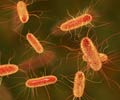E. coli, the bacteria synonymous with food poisoning and product recalls, can be used as a future source of energy to power cars and homes.
E. coli, the bacteria synonymous with food poisoning and product recalls, can be used as a future source of energy to power cars and homes, says a professor in Texas A&M University.
After genetically modifying the bacteria, Thomas Wood, a professor in Texas A&M University's Artie McFerrin Department of Chemical Engineering, has 'tweaked' a strain of E. coli so that it produces substantial amounts of hydrogen.Specifically, Wood’s strain produces 140 times more hydrogen than is created in a naturally occurring process.
The finding can prove to be a significant stepping stone on the path to the hydrogen-based economy.
In the study, the research team selectively deleted six specific genes in E. coli’s DNA. Wood basically transformed the bacterium into a mini hydrogen-producing factory that’s powered by sugar i.e. he has enhanced the bacteria’s naturally occurring glucose-conversion process on a massive scale.
“These bacteria have 5,000 genes that enable them to survive environmental changes. When we knock things out, the bacteria become less competitive. We haven’t given them an ability to do something. They don’t gain anything here; they lose. The bacteria that we’re making are less competitive and less harmful because of what’s been removed,” Wood said.
With sugar as its main power source, this strain of E. coli can now take advantage of existing and ever-expanding scientific processes aimed at producing sugar from certain crops, such as corn, Wood said.
Advertisement
“Biological methods such as this are likely to reduce energy costs since these processes don’t require extensive heating or electricity,” he added.
Advertisement
Source-ANI
LIN/M







